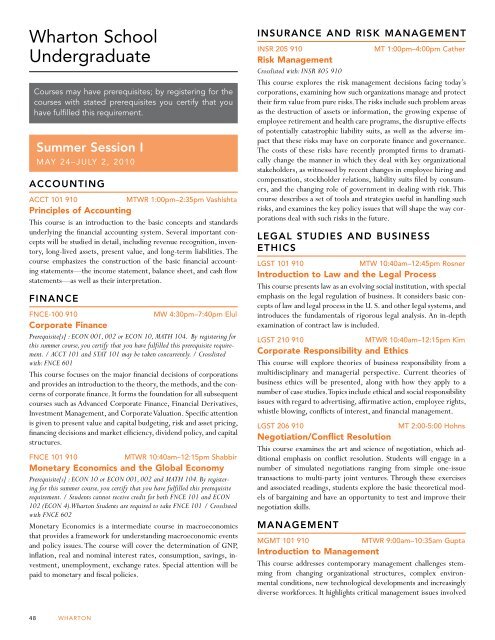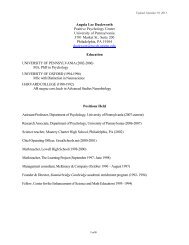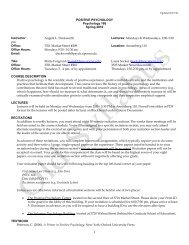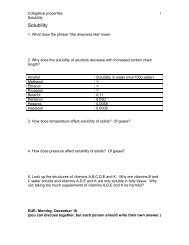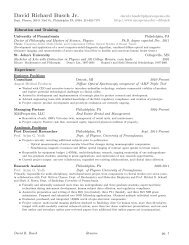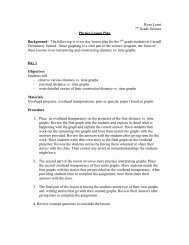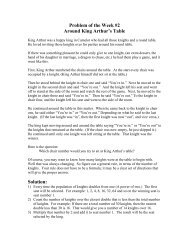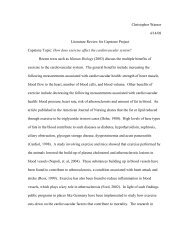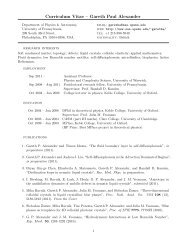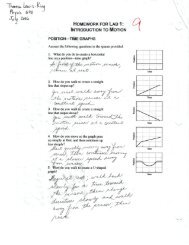PENN SUMMER - University of Pennsylvania
PENN SUMMER - University of Pennsylvania
PENN SUMMER - University of Pennsylvania
You also want an ePaper? Increase the reach of your titles
YUMPU automatically turns print PDFs into web optimized ePapers that Google loves.
Wharton school<br />
undergraduate<br />
Courses may have prerequisites; by registering for the<br />
courses with stated prerequisites you certify that you<br />
have fulfilled this requirement.<br />
Summer Session i<br />
MAY 24–JULY 2, 2010<br />
aCCoUnTinG<br />
aCCT 101 910 MTWr 1:00pm–2:35pm Vashishta<br />
Principles <strong>of</strong> Accounting<br />
This course is an introduction to the basic concepts and standards<br />
underlying the financial accounting system. Several important concepts<br />
will be studied in detail, including revenue recognition, inventory,<br />
long-lived assets, present value, and long-term liabilities. The<br />
course emphasizes the construction <strong>of</strong> the basic financial accounting<br />
statements—the income statement, balance sheet, and cash flow<br />
statements—as well as their interpretation.<br />
FinanCe<br />
FnCe-100 910 MW 4:30pm–7:40pm elul<br />
Corporate Finance<br />
Prerequisite[s] : ECON 001, 002 or ECON 10, MATH 104. By registering for<br />
this summer course, you certify that you have fulfilled this prerequisite requirement.<br />
/ ACCT 101 and STAT 101 may be taken concurrently. / Crosslisted<br />
with: FNCE 601<br />
This course focuses on the major financial decisions <strong>of</strong> corporations<br />
and provides an introduction to the theory, the methods, and the concerns<br />
<strong>of</strong> corporate finance. It forms the foundation for all subsequent<br />
courses such as Advanced Corporate Finance, Financial Derivatives,<br />
Investment Management, and Corporate Valuation. Specific attention<br />
is given to present value and capital budgeting, risk and asset pricing,<br />
financing decisions and market efficiency, dividend policy, and capital<br />
structures.<br />
FnCe 101 910 MTWr 10:40am–12:15pm shabbir<br />
Monetary Economics and the Global Economy<br />
Prerequisite[s] : ECON 10 or ECON 001, 002 and MATH 104. By registering<br />
for this summer course, you certify that you have fulfilled this prerequisite<br />
requirement. / Students cannot receive credit for both FNCE 101 and ECON<br />
102 (ECON 4). Wharton Students are required to take FNCE 101 / Crosslisted<br />
with FNCE 602<br />
Monetary Economics is a intermediate course in macroeconomics<br />
that provides a framework for understanding macroeconomic events<br />
and policy issues. The course will cover the determination <strong>of</strong> GNP,<br />
inflation, real and nominal interest rates, consumption, savings, investment,<br />
unemployment, exchange rates. Special attention will be<br />
paid to monetary and fiscal policies.<br />
48 WHArToN<br />
inSUranCe anD riSK ManaGeMenT<br />
Insr 205 910 MT 1:00pm–4:00pm Cather<br />
Risk Management<br />
Crosslisted with: INSR 805 910<br />
This course explores the risk management decisions facing today’s<br />
corporations, examining how such organizations manage and protect<br />
their firm value from pure risks. The risks include such problem areas<br />
as the destruction <strong>of</strong> assets or information, the growing expense <strong>of</strong><br />
employee retirement and health care programs, the disruptive effects<br />
<strong>of</strong> potentially catastrophic liability suits, as well as the adverse impact<br />
that these risks may have on corporate finance and governance.<br />
The costs <strong>of</strong> these risks have recently prompted firms to dramatically<br />
change the manner in which they deal with key organizational<br />
stakeholders, as witnessed by recent changes in employee hiring and<br />
compensation, stockholder relations, liability suits filed by consumers,<br />
and the changing role <strong>of</strong> government in dealing with risk. This<br />
course describes a set <strong>of</strong> tools and strategies useful in handling such<br />
risks, and examines the key policy issues that will shape the way corporations<br />
deal with such risks in the future.<br />
leGal STUDieS anD BUSineSS<br />
eThiCS<br />
lgsT 101 910 MTW 10:40am–12:45pm rosner<br />
Introduction to Law and the Legal Process<br />
This course presents law as an evolving social institution, with special<br />
emphasis on the legal regulation <strong>of</strong> business. It considers basic concepts<br />
<strong>of</strong> law and legal process in the U. S. and other Iegal systems, and<br />
introduces the fundamentals <strong>of</strong> rigorous legal analysis. An in-depth<br />
examination <strong>of</strong> contract law is included.<br />
lgsT 210 910 MTWr 10:40am–12:15pm Kim<br />
Corporate Responsibility and Ethics<br />
This course will explore theories <strong>of</strong> business responsibility from a<br />
multidisciplinary and managerial perspective. Current theories <strong>of</strong><br />
business ethics will be presented, along with how they apply to a<br />
number <strong>of</strong> case studies. Topics include ethical and social responsibility<br />
issues with regard to advertising, affirmative action, employee rights,<br />
whistle blowing, conflicts <strong>of</strong> interest, and financial management.<br />
lgsT 206 910 MT 2:00-5:00 hohns<br />
Negotiation/Conflict Resolution<br />
This course examines the art and science <strong>of</strong> negotiation, which additional<br />
emphasis on conflict resolution. Students will engage in a<br />
number <strong>of</strong> simulated negotiations ranging from simple one-issue<br />
transactions to multi-party joint ventures. Through these exercises<br />
and associated readings, students explore the basic theoretical models<br />
<strong>of</strong> bargaining and have an opportunity to test and improve their<br />
negotiation skills.<br />
ManaGeMenT<br />
MgMT 101 910 MTWr 9:00am–10:35am gupta<br />
Introduction to Management<br />
This course addresses contemporary management challenges stemming<br />
from changing organizational structures, complex environmental<br />
conditions, new technological developments and increasingly<br />
diverse workforces. It highlights critical management issues involved


